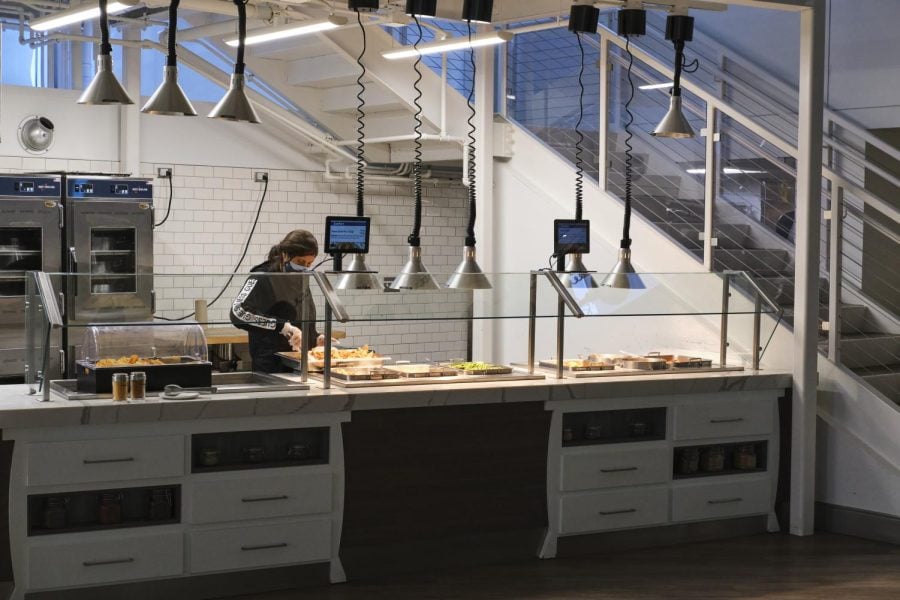Muslim students advocate for transparency in halal food options on campus
Daily file photo by Seeger Gray
A dining worker scoops food in Allison Dining Hall. Muslim students advocate for transparency in halal food options.
February 4, 2022
When Weinberg sophomore Ayesha Baig saw the label for halal food next to pork chops at Sargent, her first instinct was to post a picture on Snapchat.
“I came to campus as a freshman my Winter Quarter and I walked in (Sargent Hall) and I’m trying to figure out, ‘What can I eat here?’” said Baig, a Daily op-ed contributor. “And I see the singular halal sign that was there that day. I go toward it and it is grilled pork chops. I was so astonished.”
Baig said this failure was indicative of a larger problem that Muslim students deal with every day.
Halal food refers to the dietary standard Muslims often follow. This standard specifies the way certain meats should be prepared and prohibits other foods like pork and alcohol.
After Weinberg sophomore Assem Belhadj encountered a similar mistake at Allison Dining Hall, he decided to do something about it.
Belhadj worked with Associate University Chaplain and Director of Interfaith Engagement Tahera Ahmad and another Muslim student to establish a halal dining committee within the Muslim-cultural Students Association. They set up a meeting with dining representatives from Northwestern and Compass Group, NU’s food service provider, to initiate dialogue between them.
During their first meeting Fall Quarter, Belhadj said certain issues were difficult to articulate to the dining representatives.
“We brought up all of the concerns that everyone’s been saying and tried to organize them into different categories,” Belhadj said. “One was mislabeling, the other was lack of options and then the other one was cross contamination. There’s definitely this gap between what’s going on behind the scenes and what students feel.”
To better communicate these issues, Belhadj developed a survey for students to record instances of oversight in the dining hall.
“The majority of the responses expressed distrust of Northwestern dining because of mislabeling,” Belhadj said.
Ahmad said the problem can be addressed with more transparency between students’ needs and Compass.
She added that students’ concerns about halal meat are because of miscommunication.
“If people knew that all the meat actually is already halal except certain pre-processed or pre-packaged meat, I think that the concern would be minimal,” Ahmad said.
In a statement from Compass Group, dining representatives wrote that all of their certified halal proteins are from certified halal vendors.
Still, Baig said her faith in NU Dining hasn’t improved since her initial experience.
“Sometimes in (Sargent), they won’t have the halal sign on their chicken and then that’ll make me second guess it because it’s happened before,” Baig said. “There’s so much stress now that I’m not willing to make jumps and overestimations.”
Additionally, some Muslim students are concerned about halal meat being cooked in wine.
Despite the ongoing anxiety Muslim students experience at dining halls, Ahmad said Compass and NU Dining have been receptive to feedback and have started implementing some changes as a result of Belhadj and other Muslim students’ advocacy.
Among other changes, Compass has developed 40 recipes without alcohol to better accommodate Muslim students’ needs, Ahmad said.
“That actually is really helpful in general for Compass, not just for Northwestern,” Ahmad said. “(Because there are) so many other campuses they can utilize that for and we’re really proud that the Northwestern Muslim community is at the frontier of new dining habits.”
Email: [email protected]
Related Stories:
— What it’s like: Halal in the hall
— Student Affairs looking to increase kosher, other dietary options with master plan
— Freshmen adjust to on-campus food options, social scene in dining halls


